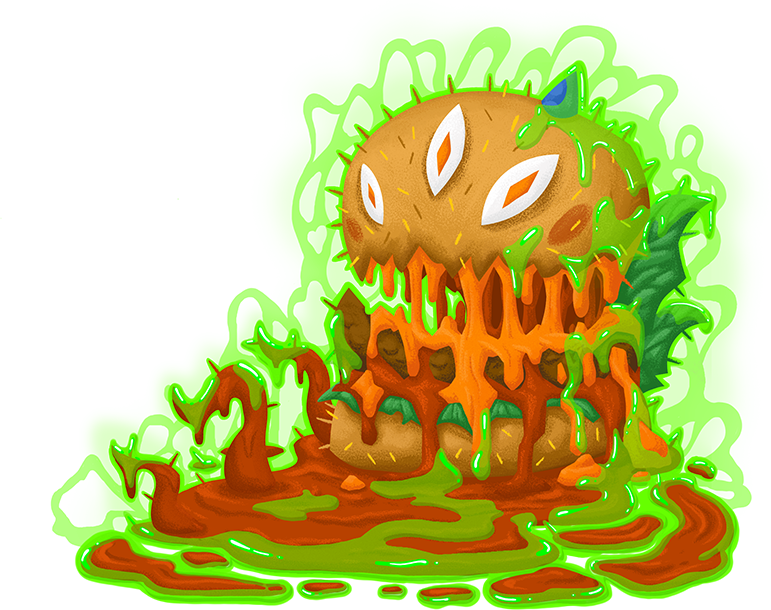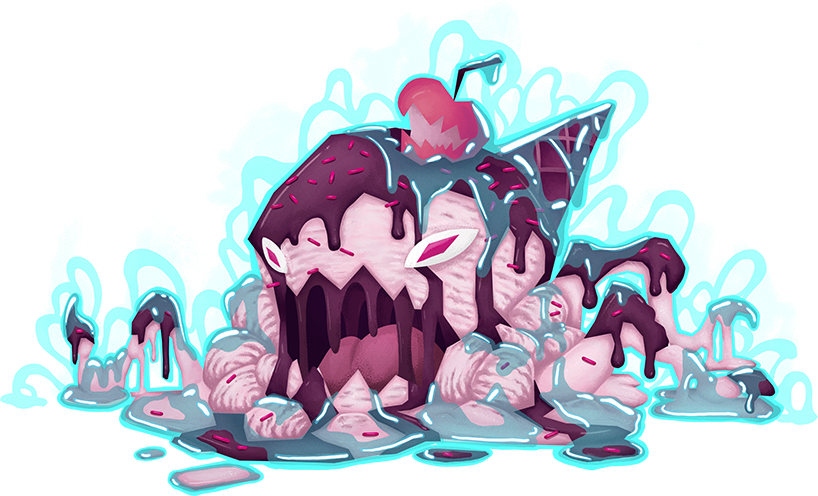Meet the Outbreaks

Hammy Burgens
- Food Type:
- Hamburger
- Pathogen:
- Shigatoxigenic E. coli O157:H7
- Location:
- A restaurant chain across four states
- Impact:
- 732 people affected
- 178 permanently damaged
- 4 deaths
The real case
In 1993, a popular fast-food restaurant ran a promotion and discounted their hamburger sales across four states. Unfortunately, the restaurant received meat contaminated with a novel strain of bacteria known as shigatoxigenic E. coli. from their suppliers. The restaurant cooked the beef according to federal standards of the time, bringing the internal temperature to 140 °F (60 °C). However, this temperature was not high enough to kill the bacteria. The guideline has since been raised to 160 °F (71.1 °C).
How to prevent or mitigate
Recalling contaminated products;ensuring that the food is cooked to above 165 °F before freezing; following reheating guidelines.

Cheesy McPizza
- Food Type:
- Frozen pizza
- Pathogen:
- E. coli O157:H7
- Location:
- Southern United States
- Impact:
- 21 people affected
The real case
In the summer of 2007, 21 individuals from 10 states across the Southeast were infected by a strain of pathogenic E. coli. The outbreak was linked to the pepperoni in two frozen pizza brands.
How to prevent or mitigate
Recall of products, ensuring that the product is cooked to above 165 degrees before freezing, consumers following reheating guidelines.

Callie N. Tae
- Food Type:
- Salsa and chili con queso
- Pathogen:
- Hepatitis A virus (HAV)
- Location:
- Pennsylvania restaurant
- Impact:
- 555 people infected
- 3 deaths
The real case
In 2003, the largest foodborne outbreak caused by Hepatitis A virus resulted in 3 deaths of the 555 people infected. The outbreak was traced back to green onions that were imported from Mexico, and used in salsa and queso.
How to prevent or mitigate
Proper washing of produce, the public being vaccinated, and proper handwashing.

Mr. Frosty Freeze
- Food Type:
- Ice cream
- Pathogen:
- Listeria monocytogenes
- Location:
- Southern United States
- Impact:
- 10 people infected
- 3 deaths
The real case
In 2015, an outbreak of listeriosis caused by Listeria monocytogenes was found in an ice cream in South Carolina. Other states were prompted to test, and also found Listeria monocytogenes in ice cream products in their states. The outbreak grew to affect 10 people in four states. Three people died as a result.
How to prevent or mitigate
Since Listeria grows best at cooler temperatures, it’s important with cold products such as ice cream to make sure that proper tests are in place to ensure the product is free of bacteria.

'Dirty Sal' Addison
- Food Type:
- Leafy greens
- Pathogen:
- E. coli O157:H7
- Location:
- 24 states
- Impact:
- 18 people affected
- 9 hospitalized
- 2 developed kidney failure
- 1 death
The real case
Between late 2017 and early 2018, the CDC and FDA were investigating several cases of gastroenteritis caused by by pathogenic E. coli. In total, 18 people were infected, 9 people were hospitalized, 2 people developed kidney failure, and 1 person died. No one company or product was ever identified as the cause of the outbreak.
How to prevent or mitigate
Product recalls, washing vegetables prior to packaging, washing vegetables after purchase, educating consumers about proper vegetable handling.

King Krusty
- Food Type:
- Frozen pot pie
- Pathogen:
- Salmonella
- Location:
- 34 states
- Impact:
- 270 people affected
- 67 hospitalized
The real case
The 2001, over 270 individuals were affected by an outbreak of Salmonella in individual frozen pot pies. The pot pies were sold under several different brand names and were distributed nationwide. The affected individuals lived in 34 different states, and 67 people were hospitalized as a result of the outbreak.
How to prevent or mitigate
Proper sanitization of processing lines, training of manufacturing employees, stricter regulations about non-compliance with food safety protocol. Ensuring products are cooked to and stored at the proper temperatures.